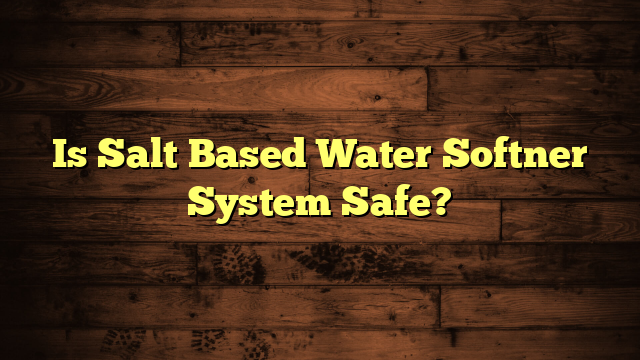Is Salt Based Water Softner System Safe?
Salt-based water softener systems are generally safe, but they come with notable health and environmental concerns. While they effectively reduce hard water minerals, the increased sodium content could pose risks for individuals with hypertension or on low-sodium diets. Regular maintenance is crucial for peak performance and longevity. Furthermore, excessive salt usage can harm local ecosystems and contaminate freshwater sources. If you're considering a salt-based system, weigh these factors carefully. Alternatives, like potassium-based softeners or salt-free systems, may better fit your needs without compromising health. Learning about these options can help you make a more informed decision.
Key Takeaways
- Salt-based water softeners can increase sodium levels in drinking water, which may not be safe for individuals on low-sodium diets or with hypertension.
- Regular maintenance is essential; neglecting it can lead to system inefficiency and costly repairs, impacting safety and performance.
- Softened water can improve skin and hair health, but some individuals may have concerns about sodium intake.
- Alternatives like potassium-based or salt-free systems are available for those worried about sodium-related health issues.
- Consulting healthcare professionals is advisable for individuals with specific health concerns regarding sodium intake from softened water.
Understanding Water Softener Systems
When it comes to managing hard water, understanding water softener systems is vital for any homeowner. Water hardness typically results from high mineral content, particularly calcium and magnesium.
To tackle this issue, you'll want to take into account various softening methods available on the market. One common approach is ion exchange, where hard water minerals are effectively swapped for sodium or potassium ions. This process not only reduces water hardness but also helps protect your plumbing and appliances from scale buildup.
You might also come across alternatives like reverse osmosis, which filters out minerals, or magnetic softeners that claim to alter mineral behavior.
Choosing the right system depends on your specific water quality and household needs. It's important to test your water hardness before making a decision, as this will guide you toward the most suitable softening method.
How Salt-Based Systems Work
Fundamentally, salt-based water softeners operate through a process called ion exchange, where hard water minerals are replaced with sodium ions. When your hard water flows through the softener, it enters a tank filled with resin beads.
These beads are coated with sodium ions. As the hard water passes over them, the calcium and magnesium ions in the water cling to the beads while the sodium ions are released into the water. This exchange effectively softens the water, making it more suitable for household use.
However, over time, the resin beads become saturated with calcium and magnesium and can no longer effectively soften the water. That's where salt regeneration comes in.
During this process, a brine solution made from salt is flushed through the tank. This solution recharges the resin beads by replacing the trapped calcium and magnesium ions with sodium ions once again.
After this regeneration cycle, your water softener can continue to provide soft water for your home. By understanding how this system works, you can better appreciate its efficiency and maintenance needs, ensuring your water remains pleasant and functional.
Health Concerns of Salt Softening
Salt softening raises several health concerns that homeowners should consider before installing a system. One of the primary issues is the increased sodium intake associated with softened water. If you have a salt-based water softener, the sodium concentration in your drinking water can rise considerably. For individuals monitoring their salt consumption, this could pose a challenge, especially if you're already consuming a diet high in sodium.
Additionally, if you're at risk for hypertension, or high blood pressure, the extra sodium might exacerbate your condition. Health experts often recommend limiting sodium intake to help manage hypertension risk. Consequently, if you or someone in your household has been advised to follow a low-sodium diet, it's vital to weigh the benefits of softened water against these health concerns.
Instead of relying solely on a salt-based system, you might want to explore alternative water softening methods, such as potassium-based softeners or salt-free systems.
Always consult with a healthcare professional if you have specific health concerns related to sodium before deciding on a water softening solution. Balancing your water quality needs with your health is essential for maintaining overall well-being.
Environmental Impact of Salt Use
The environmental impact of using salt in water softening systems can be significant and warrants consideration. When salt enters the water supply through these systems, it can lead to salt pollution, which poses serious risks to local ecosystems.
You might be surprised by how this affects the environment:
- Soil Health: Excess salt can degrade soil quality, reducing its ability to support plant life.
- Water Quality: Elevated salt levels can contaminate freshwater sources, harming aquatic life and making water unsuitable for drinking.
- Wildlife Impact: High salinity levels can disrupt habitats, affecting species that aren't adapted to saline conditions.
- Infrastructure Damage: Salt can corrode pipes and other infrastructure, leading to costly repairs and increased maintenance.
These ecosystem effects aren't just local; they can have far-reaching implications for wildlife and water quality in your community.
If you're considering a salt-based water softener, it's essential to weigh these environmental factors carefully. Understanding the broader impact of salt use will help you make an informed decision that protects both your home and the environment.
Alternatives to Salt-Based Systems
Have you ever considered how to soften your water without using salt? There are several effective alternatives to traditional salt-based systems that can meet your needs.
One popular option is potassium chloride. This mineral works similarly to sodium but is more environmentally friendly. It effectively reduces hardness in your water without releasing harmful sodium into the environment.
Another innovative choice is magnetic softeners. These devices use magnetic fields to alter the properties of hard water minerals, preventing them from forming scale. While they don't remove hardness minerals like calcium and magnesium, they can help mitigate the effects of hard water, such as scale buildup in pipes and appliances.
Both potassium chloride systems and magnetic softeners provide viable solutions for those looking to avoid salt-based systems. They offer benefits like reduced environmental impact and less sodium in your water supply.
When considering these alternatives, think about your specific needs, like the level of hardness in your water and any health considerations. Each option has its advantages, so it's important to choose the one that best fits your lifestyle and preferences.
Regulatory Standards and Guidelines
When it comes to water softeners, understanding regulatory standards and guidelines is essential for guaranteeing safety and effectiveness. You want to ascertain that any system you choose meets the necessary safety standards and achieves regulatory compliance.
Various organizations, like the National Sanitation Foundation (NSF) and the Water Quality Association (WQA), set these guidelines to protect consumers and the environment.
Here are four key points to keep in mind:
- NSF Certification: Look for products that have NSF certification, which guarantees they meet strict safety and performance criteria.
- Local Regulations: Check your local regulations, as they may have specific requirements for water softening systems.
- Environmental Impact: Some guidelines address the environmental impact of salt-based systems, promoting sustainable practices.
- Maintenance Standards: Regular maintenance is often required to maintain compliance with safety standards, so stay informed about upkeep requirements.
Benefits of Water Softening
Water softening offers several benefits that can considerably enhance your household experience. By reducing hard water, you'll notice a significant decrease in mineral buildup on your faucets, showerheads, and appliances. This not only keeps your home looking cleaner but also extends the lifespan of your plumbing and appliances, saving you money in the long run.
When you soften your water, you'll also enjoy softer skin and hair. Hard water can leave your skin feeling dry and your hair brittle, but with softened water, you'll experience a noticeable improvement in both. Your soaps and detergents will work more effectively, too, which means you'll use less while still achieving better cleaning results.
Additionally, soft water can improve the efficiency of your water heater. Hard water requires more energy to heat because of the mineral buildup, leading to higher utility bills.
Making an Informed Decision
Evaluating a water softener involves weighing various factors to guarantee it fits your household needs. You want to make an informed decision, so here are some key points to assess:
1. Cost Considerations: Evaluate both the upfront cost of the system and ongoing expenses like salt and repairs.
Determine your budget beforehand to avoid surprises later.
2. Maintenance Requirements: Understand how often you'll need to add salt and check the system's components.
Regular maintenance can save you from costly repairs down the line.
3. Water Quality: Test your water to see how hard it is.
Knowing the hardness level helps you choose the right system and understand the benefits of softening.
4. Environmental Impact: Evaluate how the salt-based system affects the environment.
Some regions have restrictions on salt discharge, so check local regulations.
Frequently Asked Questions
Can I Use a Salt-Based System in Well Water?
You can use a salt-based system in well water, but check for well water compatibility first. If you're concerned about salt, consider exploring salt alternatives that may suit your needs better for softening.
How Often Do I Need to Refill Salt in the System?
You'll want to check your salt levels regularly, ideally every month. The refill frequency depends on your water hardness and usage; if you notice increased salt consumption, it's time to refill for peak performance.
What Type of Salt Is Best for Water Softeners?
When choosing salt for your water softener, you should consider rock salt or solar salt. Rock salt is less expensive but contains impurities, while solar salt is purer and often more effective for softening water.
Can Salt-Based Systems Cause Plumbing Issues?
Imagine your pipes as resilient trees, but salt corrosion can weaken their bark. Regular plumbing maintenance helps you catch issues early, preventing costly repairs. Keep an eye on your system to protect your plumbing's health.
Are There Any Specific Maintenance Tips for Salt-Based Systems?
To maintain your salt-based system, regularly check the salt dosage and refill as needed. Schedule system cleaning every few months to prevent buildup and guarantee peak performance, helping you enjoy soft water without issues.
Conclusion
To sum up, using a salt-based water softener system can be safe, much like enjoying a good meal with the right ingredients. While health and environmental concerns exist, understanding these factors helps you make an informed choice. Weigh the benefits against potential drawbacks, and consider alternatives if needed. Ultimately, your decision should align with your lifestyle and priorities, ensuring that your water quality meets your needs without compromising health or the environment.







